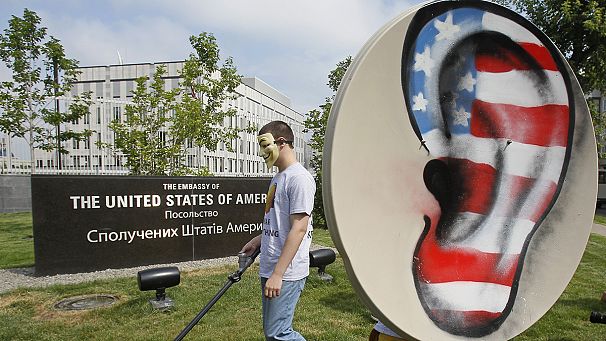Friends, Romans, countrymen, lend me your ears
 This is the first line of a famous and often-quoted speech
This is the first line of a famous and often-quoted speechby Mark Antony in the play Julius Caesar, by William Shakespeare.
What do the CIA, FBI and NSA all have in common?
Well, they all use TLAs — three-letter acronyms — to refer to themselves.
or in other words, ...
'us' against 'them':
- the FBI was created in 1908, and before that
- the CIA was established in 1947
- The NSA was unofficially redisgned in 1952
the National Security Agency's existence wasn't even officially disclosed until the 1970s. Until then, Washington insiders joked that the initials stood for "No Such Agency."
Unfortunately for such a secretive agency, the NSA made big headlines this month after a leaker revealed that it collected records of domestic telephone calls between millions of Americans who'd never been accused of any wrongdoing.
US interest in SPAIN.
Breaking telegraphic codes was quite succesful.
At its best, the confessions of Herbert O Bradley at his office in the Balck Chamber. The office was a branch of the Military Intelligence
Division, War Department.
All employees were relegated to civilian status. The mission :
"We were to read the secret code and cipher diplomatic telegrams of for-
eign governments — by such means as we could. If we were caught, it
would be just too bad !"
According to Yardley's own reminiscences : (1976)We solved over forty-five thousand cryptograms from 1917 to 1929, and at one time or another we broke the codes of Argentine, Brazil, Chile, China, Costa Rica, Cuba, England, France, Germany, Japan, Liberia, Mexico, Nicaragua, Panama, Peru, Russia, San Salvador, Santo Domingo, Soviet Union and Spain. We also made preliminary analyses of the codes of many other governments. This we did because Ave never knew at what moment a crisis would arise which would require quick solution of a particular government's diplomatic telegrams.
Recent whistleblowers:
 June 2012:
June 2012: Julian Assange, head of the Wikileaks website, was offered refuge in the London embassy of Ecuador.
June 2013:
Edward Snowden sought the relative safety of Hong Kong in the wake of his revelations of the National Security Agency's (NSA) snooping operations in collaboration with internet giants like Google.
Meanwhile Private Manning is on trial for passing confidential US State Department cables to Wikileaks.
Dissidence. It used to be that the United States stood as the safe haven of the persecuted, open to those yearning to breathe free, and London the place of refuge of all kinds of people who needed a place to be - from disgraced dictators like Metternich to revolutionary exiles like Karl Marx.
Lack in privacy. Encrypted messages, fancy technology, spies use them all to communicate, but sometimes the best way to hide is in plain sight. Right now, broadcasting across the airwaves around the world, are automated, anonymous shortwave AM radio stations that most governments won't acknowledge even exist, much less explain.
Who said this?
"Even if you're not doing anything wrong,
you're being watched and recorded".Misquoting Picasso:
“The Art of SPYING is the lie that enables us to realize the truth.”
The following are TWELVE from the 27 quotes from Edward Snowden about U.S. government spying that should send a chill up your spine...
#1 "The majority of people in developed countries spend at least some time interacting with the Internet, and Governments are abusing that necessity in secret to extend their powers beyond what is necessary and appropriate."
#2 "...I believe that at this point in history, the greatest danger to our freedom and way of life comes from the reasonable fear of omniscient State powers kept in check by nothing more than policy documents."
#3 "The government has granted itself power it is not entitled to. There is no public oversight. The result is people like myself have the latitude to go further than they are allowed to."
#5 "The NSA has built an infrastructure that allows it to intercept almost everything."
#7 "Any analyst at any time can target anyone. Any selector, anywhere... I, sitting at my desk, certainly had the authorities to wiretap anyone, from you or your accountant, to a federal judge, to even the President..."
#12 "Allowing the U.S. government to intimidate its people with threats of retaliation for revealing wrongdoing is contrary to the public interest."#15 "I don't want to live in a world where there's no privacy, and therefore no room for intellectual exploration and creativity."
#16 "I have no intention of hiding who I am because I know I have done nothing wrong."
#17 "I had been looking for leaders, but I realized that leadership is about being the first to act."
#18 "There are more important things than money. If I were motivated by money, I could have sold these documents to any number of countries and gotten very rich."
#21 "You can't come up against the world's most powerful intelligence agencies and not accept the risk."
#22 "I know the media likes to personalize political debates, and I know the government will demonize me."
#24 "I understand that I will be made to suffer for my actions, and that the return of this information to the public marks my end."
#25 "There’s no saving me."The top-secret PRISM program allows the U.S. intelligence community to gain access from nine Internet companies to a wide range of digital information, including e-mails and stored data, on foreign targets operating outside the United States. The program is court-approved but does not require individual warrants. Instead, it operates under a broader authorization from federal judges who oversee the use of the Foreign Intelligence Surveillance Act (FISA).

Some documents describing the program were first released by The Washington Post on June 6. The newly released documents below give additional details about how the program operates, including the levels of review and supervisory control at the NSA and FBI. The documents also show how the program interacts with the Internet companies. These slides, annotated by The Post, represent a selection from the overall document, and certain portions are redacted
No comments:
Post a Comment